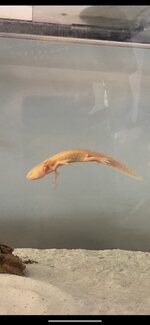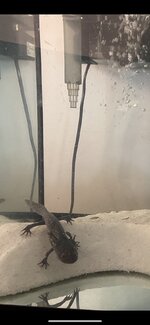Cxlash
New member
Hi all, I’m hoping you can help (or at least provide some advice). We have 2 axolotls in a 130ish L tank that is fully cycled and had been for months. Recently we had been noticing that the two axolotls had been losing weight and one of them has been losing gill filaments/ they have been shrinking so we took a water sample to the pet shop for testing.we were advised that the nitrate levels were a bit too high and that an extra water change was required (we are unsure what has happened to cause these levels to be high as with our regular weekly water changes these levels have previously remained stable). We did approximately a 40% water change as per the man who looks after axolotls at the pet shop and have increased feeding to 2x per day to increase their weight. One of the axolotls seems to be responding quite well to this, eating 2x per day and acting almost completely normal. However, one of them is not eating and we are quite worried due to how skinny he is. He hasn’t eaten in approximately 3-4 days. He does try to eat at times - he will snap at the food but if he misses it he will refuse to try again. He also has been getting some of the food in his mouth at times but then let’s the worms wriggle straight out (if live) or will just let the pellet come out of his mouth, so not actually digesting any of it. We’re really worried for him so any advice will be greatly appreciated! I will do a complete water test when I get home from work and post those values. This is the tank, and how unhealthy they are looking at this point (the yellow one is the one that is refusing to eat). The black one is the one that has Improved really quickoy and is now eating normally and acting completely normal.




